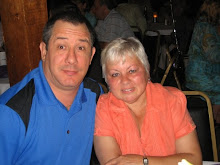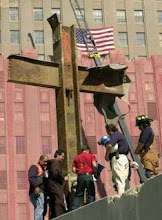We have been studying the subject of life after death. The teaching of the Church will help to answer some questions on how mediums receive answers, as well as reveal the teaching of the church regarding after death experiences.
Answering this question, the church strongly presents it's tradition that St. John the Baptist, who was beheaded, went rejoicing to declare to those in hell, the good tidings of God having appeared "in the Flesh," (Troparion for the feast of his Beheading), while Christ was in the tomb. The gospel tells us what the three eye-witnesses saw on the Mount of Transfiguration, as they beheld Moses,(whose body was buried in the grave) and Elias, having never died, yet dwells in heaven. Yet, both were present at Christ's Transfiguration. There is no need to try to understand what the Church presents to us.Clearly, our spirit does not "sleep," just our body. Sleeping is a condition of inactivity in which it does not function, hear, speak or see. Clearly all of creation is in the care of a just and loving God.
The Soul After Death, Written by: Fr. Seraphim Rose, says the following:
'"For some sixteen centuries the Fathers of the Church have spoken of the toll-houses as a part of the Orthodox ascetic teaching, the final and decisive stage of the "unseen warfare" which each Christian wages upon earth. For the same period of time numerous Lives of Saints and other Orthodox texts have described the actual experiences of Orthodox Christians, both saints and sinner, who have encountered these toll-houses after death (and sometimes before). It is obvious to all but the youngest children that the name of "toll-house" is not to be taken literally; it is a metaphor which the Eastern Fathers have thought appropriate for describing the reality which the soul encounters after death." '
' "It is also obvious to all that some of the elements in the descriptions of these toll-houses are metaphorical or figurative. The accounts themselves, however, are neither "allegories" nor "fables," but straightforward accounts of personal experiences in the most adequate language at the disposal of the teller." '
The writer then goes on to tell us that in life we are unaware of the actual nature of the unseen warfare waged during our life until the eye's of our soul are open. We then can see "the actual beings who have been attacking us during our lifetime. There is no paganism, no occultism, no "oriental astrology," no "purgatory" whatever to be found in the Orthodox accounts of the toll-houses. These toll-houses teach us, rather, of the accountability of each man for his own sins, of the fact that at death there is a summing up of his success or failure in battling against sin (the Particular Judgment), and that the demons who have tempted him throughout life make their final assault upon him at the end of his life, but have power only over those who have not sufficiently fought the unseen warfare in this lifetime." '
' "The teaching of the toll-houses in Orthodox sources has never been defined as a "dogma," belonging rather to the tradition of Orthodox piety; but this does not mean that it is something "unimportant" or something that is a matter of "personal opinion." It has been taught everywhere and at all times in the Church wherever the Orthodox ascetic tradition has been handed down."
Saint Macarius the Great, one of the basic works of Orthodox ascetic literature (A. J Mason translation, Eastern Orthodox Books, Willitis , CA, 1974): "When the soul of a man departs out of the body, a great mystery is there accomplished. If it is under the guilt of sins there come bands of devils, and angles of the left hand, and powers of darkness take over that soul, and hold it fast on their side. No one ought to be surprised at this. If while alive and in this world, the man was subject and compliant to them, and made himself their bondman, how much more, when he departs out of this world, is he kept down and held fast by them (Homily 22, p. 171). But if whilst they are yet in the flesh, they shall with much labor and effort obtain from the Lord the grace from on high, assuredly these, together with those who through virtuous living are at rest, shall go the Lord, as He promised....(Homily 43, p. 274)."
Taken from "On Spiritual Knowledge" by St. Diadochos of Photike:
There are many sources that verify the demonic testing at death, even if one thinks the toll-houses imaginary. The teaching of the toll-houses is given us to help us overcome our lifetime struggles in order to avoid meeting with them after death, repelling the assaults of the dark spirits of the air. Orthodox Christians seldom hear such things nowadays, and owe much to the representatives who hold the Orthodox ascetic tradition, from the earliest centuries.
We are accountable to a "loving God" and must understand the judgment that death brings to us all. We must be spiritually awake, and put off the "old man" and ways that lead to death, knowing that we cannot be assured of salvation without the mercy that only Christ can give. We therefore, with the fear of God, struggle for the Kingdom of Heaven against all the unseen enemies who oppose our path. Orthodox tradition remains the same, no matter how few may follow it. Who do you believe? Not some mystic, I hope, with clearly an unknown source. It seems that the evil spirits are very aware of all that goes on here on earth and in the air while they remain hidden.
We are in the end, called to be the children of God, to put on Christ, our only
Savior. We are to be obedient to His commandments and do His will, loving our God, neighbor, and, to pray for those who have gone before us, especially on those special days assigned by the Church for that purpose, because of our love for them and to help them to a place of blessed peace, which is also our hope.



























1 comment:
Post a Comment